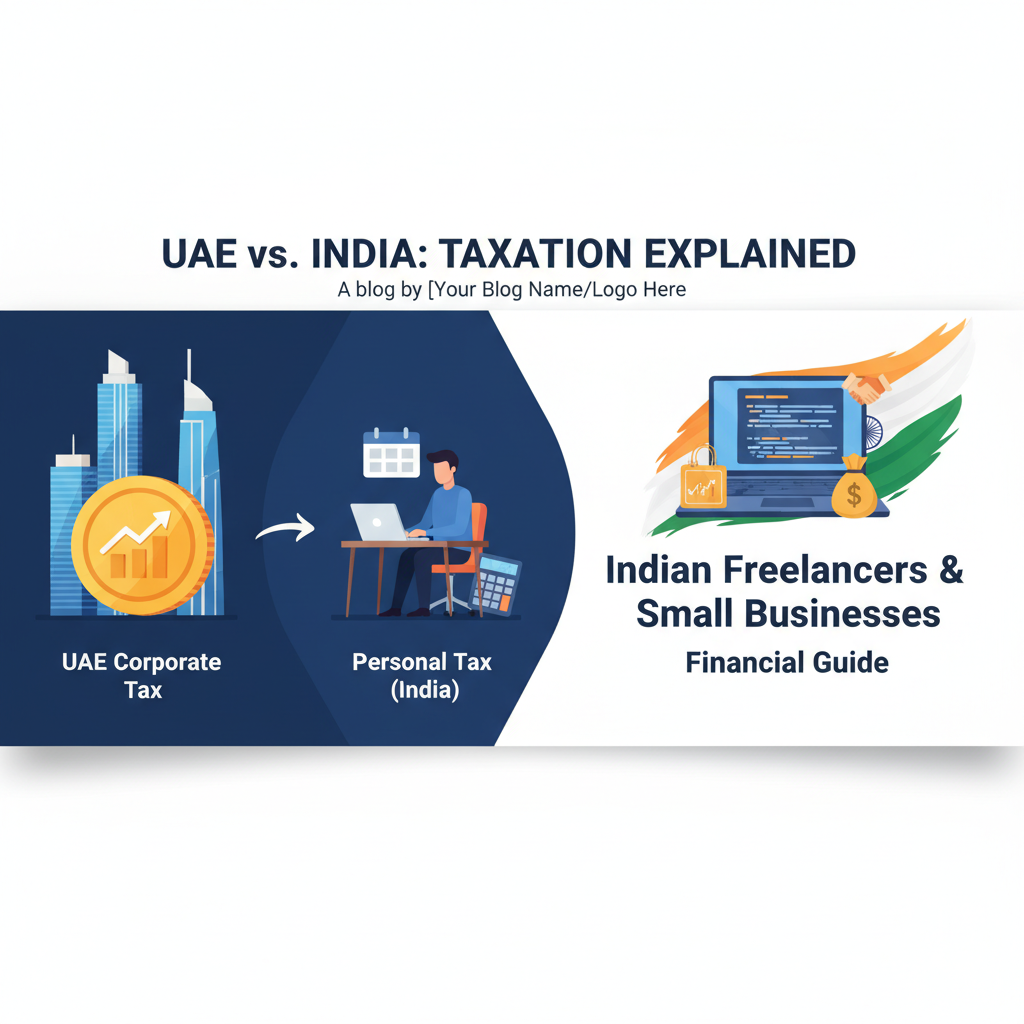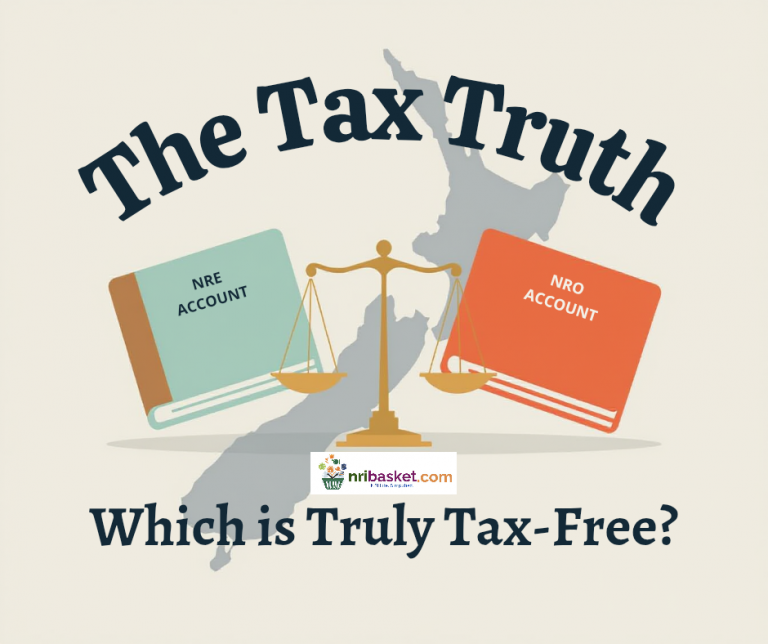
UAE Corporate Tax vs. Personal Tax
UAE Corporate Tax vs. Personal Tax: A Financial Guide for Indian Freelancers and Small Business Owners
This FAQ guide is designed for Indian freelancers, entrepreneurs, and small business owners living or working in the UAE. It explains how UAE corporate tax for Indian expats and tax on freelance income Dubai works, in a simple question–answer format. Let’s dive into the most common queries.
long answer: Individuals in the UAE, including Indian expats and freelancers, are not taxed on their salaries, wages, or freelance income at the personal level. However, corporate and business income may fall under the UAE Corporate Tax regime depending on your setup.
long answer: From June 2023, UAE introduced a federal corporate tax. Businesses and freelancers registered with a license and earning more than AED 375,000 in net profits annually are subject to a 9% corporate tax. Income below this threshold is taxed at 0%.
long answer: Freelancers operating under a freelance visa or trade license are considered business entities. Their net profit above AED 375,000 is taxable at 9%. If income is below this, no tax is payable, but they must still comply with registration and filing.
long answer: If you are an Indian expat working in Dubai under a freelance permit or professional license, your income is classified as business income. Once profits cross AED 375,000, you are liable for 9% corporate tax. Below this threshold, no tax applies.
long answer: Employment income in UAE is not taxed. However, if you freelance legally with a permit, your business income must be declared and corporate tax rules apply. If you freelance without registration, you risk penalties.
long answer: If you are an NRI (Non-Resident Indian) and meet the residency criteria, your UAE income is not taxable in India. If you remain a tax resident of India, global income (including UAE earnings) must be declared in India. The India-UAE Double Taxation Avoidance Agreement (DTAA) helps prevent double taxation.
long answer: Only business profits above AED 375,000 are subject to the 9% corporate tax. Any amount below remains exempt, ensuring support for startups, freelancers, and small business owners.
long answer: All businesses, including sole proprietors, freelancers, and SMEs, must register with the Federal Tax Authority (FTA) for corporate tax. Even if their profits are below the taxable threshold, filing compliance is required.
long answer: India taxes freelancers based on slabs, often ranging from 5% to 30%. In UAE, freelancers pay 0% up to AED 375,000 and only 9% thereafter, making UAE much more attractive for Indian expats.
long answer: Indian nationals running companies in the UAE are subject to corporate tax just like any other business. Ownership nationality does not exempt businesses from tax compliance.
long answer: VAT (Value Added Tax) is 5% and applies on goods and services supplied in the UAE. Corporate tax applies only on business profits above AED 375,000. Both may apply depending on your business activity.
long answer: A sole proprietor or freelancer is treated as a taxable person if they hold a business license. They must register for corporate tax and file returns annually if their income is taxable.
long answer: UAE free zones may still enjoy tax incentives if they meet “Qualifying Free Zone Person” criteria. However, if free zone businesses transact with mainland UAE, normal corporate tax applies. Always check your free zone’s updated rules.
long answer: Taxable income is calculated based on accounting profits prepared under IFRS, with adjustments. Allowable expenses, depreciation, and exemptions reduce taxable income, and 9% applies on the amount above AED 375,000.
long answer: Side hustles, such as consultancy, digital services, or e-commerce, require a trade or freelance license. Profits above AED 375,000 will be taxed at 9%, but below this, no tax applies.
long answer: Failure to register with the Federal Tax Authority may result in heavy fines, backdated tax liability, and legal consequences. Compliance is mandatory even if your profits are below the threshold.
long answer: If you operate from UAE with a freelance visa and earn from global platforms, this income is classified as UAE-sourced business income. Corporate tax applies above AED 375,000.
long answer: India and UAE have a Double Taxation Avoidance Agreement. If you pay corporate tax in UAE, you won’t be taxed again on the same income in India, provided you qualify as an NRI under Indian rules.
long answer: Businesses in UAE can carry forward tax losses to offset future profits, reducing tax liability. However, there are conditions such as ownership continuity and maximum carry-forward percentages.
long answer: Indian founders who set up startups in Dubai must register for corporate tax. Profits up to AED 375,000 are exempt; above this, 9% applies.
long answer: Independent consultants with a freelance or trade license in UAE are considered taxable persons. They must register, file, and pay tax on profits above AED 375,000.
long answer: UAE does not have personal income tax. Only corporate tax exists, which applies to business profits. Individuals earning salaries do not pay tax, but business owners and freelancers may.
long answer: Regardless of whether freelancing is full-time or part-time, if you hold a business or freelance license, you must register. The 9% applies only above AED 375,000 in profits.
long answer: Income under AED 375,000, government entities, certain natural resource businesses, and qualifying free zone companies are exempt. However, freelancers and normal small businesses are generally covered.
long answer: Content creators in UAE must obtain a license to monetize their platforms. Once licensed, their business income is subject to corporate tax rules.
long answer: Personal rental and investment income is not taxed. However, if managed under a business structure, it may attract corporate tax depending on classification.
long answer: Businesses and freelancers must file annual corporate tax returns with the Federal Tax Authority, declaring their income, expenses, and profits for the financial year.
long answer: Unlike India, which has progressive tax slabs, UAE applies a flat 9% tax rate on profits above AED 375,000, regardless of business size. Multinationals may face additional OECD rules.
long answer: Even small family-owned businesses in UAE are subject to corporate tax if their net profits exceed AED 375,000. Below that, they enjoy a 0% rate but must still file returns.
long answer: Tax liability is based on UAE profits, not on where the money is sent. Even if freelancers remit income to India, UAE corporate tax applies on local earnings.
long answer: Personal crypto trades are not taxed in UAE. However, if you run a crypto exchange or business, it falls under corporate tax.
long answer: India’s tax rates on business income can go up to 30%, while UAE has only 9% above AED 375,000. This makes UAE highly competitive for Indian expats.
long answer: If annual profits are below AED 375,000, no tax is payable. However, freelancers must still register and submit tax filings to remain compliant.
long answer: Business-related expenses such as rent, software, internet, and equipment are deductible from your income. This reduces taxable profit, helping freelancers lower their tax liability.
long answer: To avoid penalties, Indian freelancers in UAE should: obtain a proper freelance license, register for corporate tax with FTA, maintain financial records, claim eligible deductions, and file annual tax returns on time.




